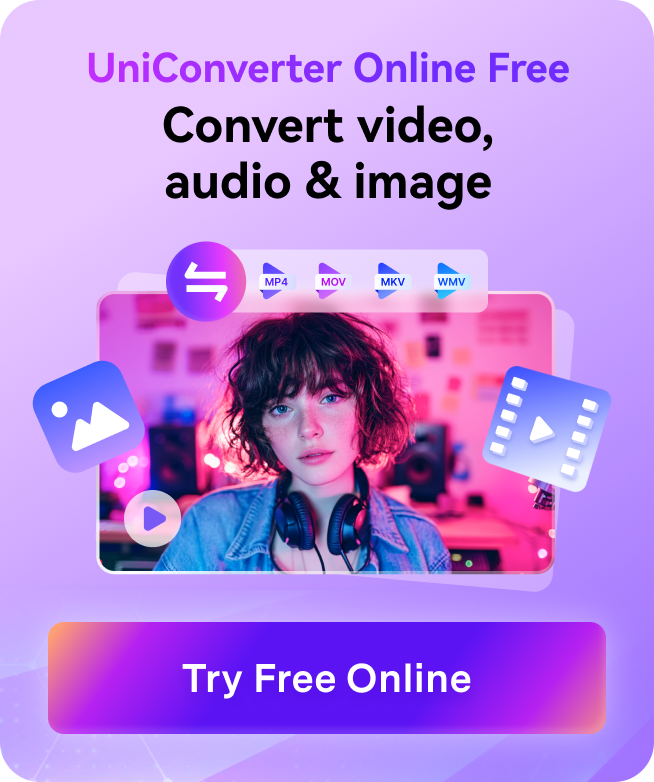Converting images to 100KB is essential for optimizing them for sharing, storage, and web use. Whether you're working with a 100KB image converter or an online tool to compress images to 100KB, achieving the right balance between size and quality can enhance website performance and user experience. This guide explores the best tools and techniques to convert images to 100KB, ensuring you retain clarity while meeting file size requirements. Perfect for both professionals and casual users, these solutions make image optimization effortless and effective.
In this article
- Part 1: A Beginner’s Guide to Popular Image Formats
- Part 2: Why Do You Need to Convert an Image into 100 KB?
- Part 3: How to convert an image into 100 KB on PC?
- Part 4: How to convert an image into 100 KB online?
- Part 5: How to convert an image into 100 KB on a phone?
- Part 6: How to enhance your image after compressing?
- Conclusion
- FAQs
Part 1: A Beginner’s Guide to Popular Image Formats
Understanding image formats is essential when selecting tools to convert images to 100KB efficiently. Each format serves different purposes, and choosing the right one ensures quality and compatibility.

1. JPEG: JPEG is widely used for photos and web content due to its efficient lossy compression. It reduces file size significantly while maintaining acceptable quality, making it ideal for when you need to convert image to 100KB. This format is perfect for sharing high-quality visuals with reduced storage requirements.
2. PNG: PNG is best for graphics or images requiring transparency, such as logos or icons. While it produces larger files compared to JPEG, it preserves high-quality details, even after compression. If you’re working with transparent backgrounds, PNG is a great choice for a 100KB photo size converter.
3. GIF: GIFs are primarily used for simple animations or low-resolution images. Although they can be compressed, their limited color palette makes them unsuitable for high-quality compression needs. However, for small visuals, GIFs can be processed with tools like a 100KB image compressor to achieve optimized results.
4. WebP: WebP is a modern image format developed by Google, providing excellent compression while preserving image clarity. It is highly efficient for web use, combining the benefits of JPEG and PNG. If you need to compress an image to 100KB online, WebP offers a balance between quality and size.
5. BMP: BMP files are large, uncompressed formats commonly used in professional printing and graphics editing. Due to their size, they are not ideal for web use but can be converted into more efficient formats like JPEG or PNG using a 100KB photo compressor.
Selecting the right format before using tools like a photo compressor to 100KB ensures your images are optimized for quality and purpose.
Part 2: Why Do You Need to Convert an Image into 100 KB?
Converting an image into 100KB offers several advantages, making it a practical choice for various applications. Here’s why it’s important:

1. Faster Upload Speeds: Smaller file sizes, such as those achieved with a photo compression to 100KB, reduce upload times significantly. This is particularly helpful when sharing images via email or uploading to web platforms with slow or limited internet connections.
2. Platform Compliance: Many platforms, including government portals, job application sites, and online forms, have strict file size limits. By using a 100 KB photo converter, you can ensure your files meet these requirements without hassle.
3. Efficient Storage: Compressing images to 100KB allows you to store more files on your device without running out of space. A 100kb photo compressor is especially useful for archiving or managing photo collections efficiently.
4. Optimized Website Performance: Smaller images load faster on websites, improving page speed and enhancing both user experience and SEO rankings. Tools like a 100 KB image converter help web designers ensure that their images are optimized for web use.
Whether for personal storage, professional tasks, or web optimization, converting images to 100KB using tools like a photo compressor to 100KB online provides practicality and versatility without compromising quality.
Part 3: How to convert an image into 100 KB on PC?
Converting an image into 100 KB on a PC can be done easily with tools designed for precise compression. One such tool is Photoshop, a professional-grade image editing software. While it’s widely known for editing, Photoshop’s compression features allow users to adjust image size and quality effectively. With advanced controls and high compatibility, it’s perfect for tasks requiring detailed adjustments to meet size limits.

Key Features
- Precise Compression Settings: Adjust quality, resolution, and file size with detailed controls for optimal results.
- Batch Processing: Compress multiple images at once, saving time and effort.
- Format Support: Compatible with a wide range of formats, including JPEG, PNG, and GIF.
- Preview Option: Real-time preview of changes ensures you get the desired quality and size.
- Metadata Preservation: Retains important metadata even after compression.
Stepwise Guide to Convert an Image into 100 KB Using Photoshop
Step 1: Open Your Image
Launch Photoshop and open the image you want to compress. Use the "File > Open" menu or drag the file into the workspace.
Step 2: Adjust Compression Settings
Go to "File > Export > Save for Web." Select the desired format, like JPEG, and use the quality slider to reduce the size. Monitor the file size at the bottom-left corner of the dialog box to ensure it’s under 100KB.
Step 3: Save and Export
Click "Save," choose the destination folder, and name your file. The compressed image will be stored in your selected location, ready for sharing or uploading.
Part 4: How to convert an image into 100 KB online?
TinyPNG is one of the most reliable online tools for compressing images while retaining quality. It specializes in reducing the file size of PNG and JPEG images without compromising their clarity. Ideal for quick and straightforward compression tasks, TinyPNG’s drag-and-drop interface ensures ease of use for beginners and professionals alike. With secure file handling and real-time compression, it’s an excellent choice for converting images to 100 KB.

Key Features
- Drag-and-Drop Functionality: Upload images effortlessly with a simple drag-and-drop feature.
- JPEG and PNG Support: Compresses two of the most common image formats for broad compatibility.
- Real-Time Quality Comparison: Displays the compressed size and quality side-by-side for user satisfaction.
- SSL Encryption: Ensures secure file uploads and downloads.
- Free Usage: Allows free individual file compression under 5MB.
Stepwise Guide to Convert an Image to 100KB Using TinyPNG
Step 1: Upload Your Image
Visit TinyPNG and drag your image file into the designated upload area. The tool accepts both PNG and JPEG formats.
Step 2: Compress the Image
Once uploaded, TinyPNG automatically compresses your image. The tool reduces the file size while preserving its visual integrity, ensuring your image is close to 100KB.
Step 3: Download the File
After compression, click the "Download" button to save your optimized image to your device. The compressed image is now ready for sharing or uploading.
Part 5: How to convert an image into 100 KB on a phone?
Photo Compressor and resizer is a versatile Android app that specializes in compressing images quickly and efficiently. With its user-friendly interface, it allows users to reduce image sizes while maintaining clarity. The app also includes additional features like resizing and cropping, making it a complete solution for on-the-go image optimization. Whether you need to compress images for social media or document uploads, Photo Compressor and resizer ensures hassle-free compression to 100KB.

Key Features
- Real-Time Adjustments: Modify file size instantly while previewing image quality.
- Lossless Compression: Offers options to reduce file size without losing visual integrity.
- Batch Processing: Compress multiple images simultaneously, saving time.
- Resize and Crop: Easily resize and crop images directly within the app.
- Simple Interface: Designed for ease of use, suitable for all skill levels.
Stepwise Guide to Convert an Image to 100KB Using Photo Compressor and resizer
Step 1: Upload Your Image
Launch the Photo Compressor and resizer app and select the image you want to compress from your gallery. The app supports common formats like JPEG and PNG.
Step 2: Adjust Compression Settings
Set the desired file size to 100KB by adjusting the compression slider. Preview the image to ensure it retains acceptable quality after compression.
Step 3: Save the Compressed Image
Save the optimized image to your device or share it directly through the app. Your image is now compressed to 100KB and ready for use.
Part 6: How to enhance your image after compressing?
After compressing an image to 100KB, enhancing its quality ensures it retains sharpness and appeal. UniConverter Image Enhancer is a powerful tool designed to restore clarity, improve brightness, and balance colors automatically. It provides a seamless way to refine your compressed images without compromising file size. With features like batch processing and AI-powered enhancement, UniConverter ensures your images look professional and visually appealing.
Best Image Enhancer
Key Features
- AI-Powered Enhancement: Automatically restores sharpness, adjusts brightness, and balances colors for polished visuals.
- Batch Processing: Enhance multiple images at once, saving time on large projects.
- Wide Format Compatibility: Supports various formats like JPEG, PNG, BMP, ensuring flexibility for image enhancement.
- Customizable Settings: Fine-tune contrast, saturation, and brightness manually to meet specific needs.
- One-Click Operation: Simplified interface for quick and hassle-free enhancement of compressed images.
Stepwise Guide to Enhance Images Using UniConverter
Step 1: Upload Your Compressed Image
Open UniConverter and navigate to the Image Enhancer tool. Drag and drop your compressed image or upload it directly from your device. This tool supports multiple formats, making it easy to enhance images like JPEG or PNG.

Step 2: Apply Enhancements
Select the AI enhancement option to automatically improve brightness, sharpness, and color balance.

Step 3: Save and Export
Once satisfied with the enhancements, export the image in high resolution to your desired location. UniConverter ensures the enhanced image is optimized for both quality and size, ready for personal or professional use.

UniConverter Image Enhancer simplifies the process of refining compressed images, ensuring they maintain their visual appeal while staying within file size limits. Whether you're handling images for web use or professional projects, it’s the perfect solution for restoring quality.
Conclusion
Converting images to 100KB is an essential step to optimize them for sharing, storage, and web use, ensuring faster upload speeds and compliance with platform-specific size limits. Tools like GIMP for PC, TinyPNG for online use, and Photo Compress 2.0 for mobile simplify the compression process. For post-compression refinement, UniConverter’s Image Enhancer offers exceptional features such as AI-powered adjustments, batch processing, and customizable settings to restore image quality effortlessly. Beyond image enhancement, UniConverter also includes versatile tools like a Watermark Remover to clean up visuals, a Noise Remover to ensure clarity, and Video Stabilization to improve shaky footage. These advanced features make UniConverter an all-in-one solution for managing multimedia with precision and ease. By leveraging these tools, you can maintain the perfect balance of size and quality for all your projects.
FAQs
Q1: Can I convert images to 100KB without losing quality?
Yes, tools like TinyPNG and UniConverter use advanced compression techniques to reduce file size while maintaining excellent quality, perfect for both web and personal use.
Q2: Is it safe to use online image compressors?
Most online tools, like TinyPNG, ensure safety by using secure servers with SSL encryption to protect your files during the compression process.
Q3: What is the best format for compressing images?
JPEG is ideal for photos due to its balance of quality and size, while PNG is best for graphics needing transparency or high detail.
Q4: Can I enhance an image after compression?
Yes, UniConverter’s Image Enhancer can restore sharpness, improve colors, and adjust brightness, making compressed images look polished and professional.
Q5: Are these tools free to use?
Many tools, such as TinyPNG and GIMP, offer free versions with basic features, while premium plans unlock advanced functionalities.


